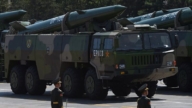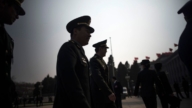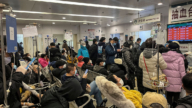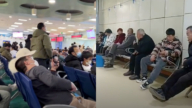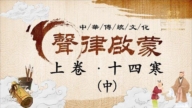【新唐人2015年01月28日訊】中共中央政治局日前通過「國家安全戰略綱要」,強調黨對國家安全的絕對領導。雖然中共官方媒體並沒有透露內容,但引起各界關注。根據美國《紐約時報》報導,中央政治局警告,中國目前面臨國內外極大危機。有評論認為,這是中共總書記習近平再次收權的動作。
中共中央政治局1月23號召開會議,審議通過「國家安全戰略綱要」,強調黨對國家安全的絕對領導。
根據中共官媒《新華社》的報導表示,這場會議是由中共中央總書記習近平主持,會議認為,當前改革進入攻堅期和深水區,社會矛盾多發疊加,並強調,當前各種可以預見和難以預見的安全風險挑戰,前所未有。
根據美國《紐約時報》報導指出,中共中央政治局批准「國家安全戰略綱要」,確定國家安全領域的優先解決事項,並警告中國大陸面臨嚴峻的內部和外部危險,讓習近平完成了將安全事務置於議事日程核心位置的最後一步。
美國中文雜誌《中國事務》總編輯伍凡:「共產黨內部反腐敗打老虎,打了兩年了,引起共產黨內部激烈的鬥爭,習近平要把所有的權力集中在國家安全委員會,所以全國人大、國務院、政協、法院、最高法院、最高檢察院,所有的權力集中到國家安全委員會,也就集中到國家安全委員會主席習近平手上。」
《紐約時報》認為,雖然強調危險迫在眉睫,是中共領導人一貫的政治語言,但習近平比他的前任們,更熱衷把自己描繪成「國家利益的堅強捍衛者」。
這個會議還強調,必須堅持共產黨對國家安全工作的絕對領導,堅持集中統一、高效權威的國家安全工作領導體制。
英國廣播公司《BBC》報導說,習近平身兼國家主席、中央軍委主席、國安委主席及深化改革領導小組組長多種職務,形成對權力的全面壟斷。而這次會議再次強調,堅持集中統一、高效權威的國家安全工作領導體制,無疑是重申了習近平的絕對領導地位。
中國問題專家石實:「這個安全法本身就代表一個象徵的意義,就是現在中國,其實就是中共處於內外的危機,它要發出的是這個信號,第二個,這個安全法出台之後,它後面還會有一系列的東西,根據國家安全法所做出的舉動,那種行動,你比如說國家安全委員會,那麼根據這個新的安全法,那個國安委它的職責可能會擴展。」
中國問題專家石實認為,按照之前反腐「抓老虎」的模式,國家安全法出台的大背景,有可能是為清洗江澤民那一派。
中國問題專家石實:「第一個,就是貪腐,比如這個人的貪腐在海外曝光;第二個,有可能是在國內他就開始慢慢引用,慢慢地放出一段口子,然後互相之間討論;第三,他開始動他週邊的人,把那些人全部抓起來,抓起來之後,然後看看那個輿論差不多了就公佈,那前面無論是從徐才厚、周永康來看,他基本上都是這樣。」
1月23號,中共政治局還罕見集體學習了「辯證唯物主義」。從此後各類解讀來看,官方已經將這次「學習」定性為毛、鄧兩次思想領域鬥爭奪權後的第三次大舉措,官媒自己都承認這往往是「大行動的開始」。
採訪/朱智善 編輯/黃億美
CCP Politiburo: China is Facing Huge Crisis
At Home And Abroad
The Chinese Communist Party (CCP) Politburo recently
passed the National Security Strategy Outline,
stressing the party’s absolute leadership
over national security.
Although the CCP’s official media did not disclose
the content, it has received attention from society.
According to U.S. The New York Times,
the CCP Central Politburo warned that China
is facing great crisis at home and abroad.
Some commentators believe that this is CCP General
Secretary Xi Jinping’s next move to tighten control.
The CCP Central Politburo meeting was held on Jan. 23.
It reviewed and passed the National Security Strategy
Outline, stressing the party’s absolute leadership
over national security.
According to CCP official media Xinhua News Agency,
the meeting was presided over by CCP General Secretary
Xi Jinping.
The conclusion of the meeting was that the current reform
has entered a crucial and challenging stage, with multiple
layers of social conflicts, and there are unprecedented
predictable and unpredictable risks and security challenges.
According to The New York Times, the National Security
Strategy Outline approved by the CCP Central Politburo
determines priorities of national security, and warned about
serious internal and external dangers China is facing.
It enables Xi Jinping to complete the last step
of placing security affairs as key issues.
U.S. Chinese magazine China Affairs editor Wu Fan:
“The CCP has carried out the anti-corruption movement
for over two years.
It has caused intense internal struggle.
Xi Jinping wants all the power consolidated
to the National Security Council, including the NPC,
the State Council, the CPPCC, the courts,
the Supreme Court and Supreme People’s Procuratorate.
All power is concentrated to the National Security Council,
which means to Xi Jinping."
The New York Times reported that while emphasizing
imminent danger has always been the CCP leadership’s
political language, Xi is more keen than his predecessors
to portray himself as “a strong defender of national interests".
The meeting also emphasized adherence
to the absolute leadership of the CCP over national security
and adherence to a centralized, efficient and authoritative
national security leadership system.
The BBC reported that Xi Jinping has formed
a comprehensive monopoly of power with titles
of President, Chairman of the Central Military Committee,
Chairman of National Security Committee
and Leader of Deepening the Reform Leadership Team.
This meeting again stressed to adhere to a centralized,
efficient and authoritative national security leadership system.
It undoubtedly reaffirmed Xi Jinping’s absolute leadership.
China Expert Shi Shi:
“This Security Act itself has a symbolic meaning.
It wants to send out a signal that
the CCP is facing crisis inside and outside.
A series of moves will follow the Security Act.
For instance, responsibilities of the National Security
Council might expand."
Shi Shi thinks according to previous anti-corruption model,
the introduction of the National Security Act
may be used to cleanse the Jiang Zemin faction.
Shi Shi: “First is corruption,
such overseas exposure of an individual’s corruption;
Then China might begin to quote and discuss the information;
Third, people around the individual will be arrested.
Once the public is ready,
the announcement will be made.
No matterwhether its Xu Caihou or Zhou Yongkang,
their cases basically were handled in such ways."
On Jan. 23, the CCP Central Political Bureau also
collectively studied “Dialectical Materialism."
The officials admitted this “study" is the third
major initiative following the two ideological struggles
to seize power conducted by Mao Zedong
and Deng Xiaoping.
Even official media admits this is often
the “Beginning of a Big Action."
Interview/Zhu Zhishan Edit/Huang Yimei



